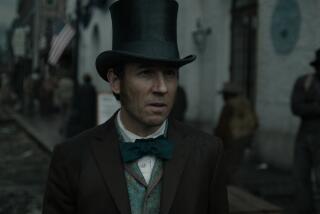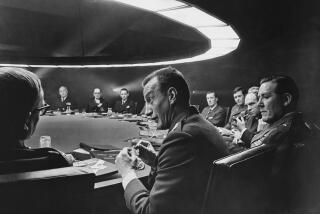Book review: ‘Watergate’
Watergate
A Novel
Thomas Mallon
Pantheon: 448 pp., $27.95
A few months ago I attended a book launch party for Adam Hochschild’s World War I history, “To End All Wars: A Story of Loyalty and Rebellion, 1914-1918,” where he offered a concise dissection of the difference between writing novels and writing history. To write history, he said, the story needs only to be true. To write a novel, the story must be plausible — an often much more difficult thing to accomplish.
With writer-critic Thomas Mallon’s new book, “Watergate: A Novel,” we have something of a hybrid. It’s fiction in which Mallon novelizes historical events to find human insights that may have eluded the shelves of nonfiction books spawned by the 1970s political scandal that toppled President Richard M. Nixon. So within the framework of the true, Mallon also has to find the plausible, which he has done in satisfying ways with one large asterisk — context.
It’s been nearly 40 years since Watergate, a chain of events that did, in fact, carry the echoes of a bad novel. Imagine the overview: People working for a powerful president get caught breaking into the headquarters of the opposition political party, setting off a scandal that reaches the highest level of power and threatens the very foundations of the government itself.
Preposterously melodramatic. Except it really happened.
In “Watergate,” Mallon adeptly converts the real into fiction. This is Mallon’s eighth novel, including 1994’s “Henry and Clara,” about a couple that President Abraham Lincoln invited to sit in the presidential box at Ford Theater that fateful night he was assassinated, and 2007’s “Fellow Travelers,” about a gay romance in McCarthy-era Washington.
So Mallon has the experience, both in fictionalizing history and in plumbing the depths of Washington, where he lives. In “Watergate,” he adroitly captures the banal venality of Nixon, the loyal scheming of his political intimates and the complex interactions among shadowy ex-CIA agents and others that ended in criminal acts.
Mallon also conjures up back stories for some of the characters and frames others from a more humane perspective than history has bestowed upon them. Fred LaRue, the prison-bound bagman who delivered about $300,000 to the Watergate burglars to ensure their silence, picks up a liberal girlfriend. Nixon’s loyal and long-serving secretary Rosemary Woods drunkenly erases more than 18 minutes of a secret White House tape. Burglar E. Howard Hunt’s world collapses around him with the Watergate exposé and the death of his wife in a plane crash.
They all come alive here, and somewhat sympathetically. For those of us who were around during those riveting days, the scenarios carry the ring of truth. But that was a long time ago — more than half of the current U.S. population hadn’t been born. And here’s where Mallon runs into a bit of trouble.
Mallon frames his novel with the expectation that the core events, and many of the characters, are known to the reader. The seven or so main characters get fleshed out, but the crucial bit characters, such as Nixon’s real aides H.R. Haldeman and John Ehrlichman, are mainly off stage, and references to them will likely confuse a reader not versed in the lore and figures of Watergate. It feels as though Mallon has simply clipped off part of the overarching narrative, focusing on the personalities and leaving the plot to develop out of sight.
Still, for the knowledgeable, Mallon renders the era, the people and the place in vivid detail. He’s particularly good at imagining an internal landscape for Woods, and weaves in a romantic affair for First Lady Pat Nixon. His portrayal of Alice Longworth is brilliant, with biting quip rolling from the nonagenarian daughter of Teddy Roosevelt in a withering stream.
And they are deliciously catty. A “dream” ticket of Ted Kennedy (Chappaquiddick) and Thomas Eagleton (whose electro-therapy cost him a vice presidential nomination on the Democratic ticket headed by George McGovern) sparks the slogan, “Kennedy and Eagleton: Waterproof and Shockproof.” At a dinner party Nixon relates that Henry Kissinger thinks it might be a good thing if the North Vietnamese think Nixon is crazy. “Are we talking about your actual craziness,” Longworth says, “or their perception of it?” And as Joan Kennedy bends to kiss the old woman’s cheek, Longworth recoils: “That’s why I usually wear a wide-brimmed hat.”
It’s these human touches that ultimately make “Watergate” work. Mallon’s imagery is at times surgically precise, as in describing Vice President Spiro Agnew, who would soon quit ahead of corruption charges unrelated to Watergate, as “sleek as a seal in a circus, comfortable in his body and expensive suit, and always beautifully groomed.” And this, as Mallon describes Pat Nixon surreptitiously sending a small press clipping to her former lover:
“To this day she kept a book of stamps in her purse — a housewifely habit that Rose teased her about. Eisenhower’s eight-cent face seemed slightly accusing as she brought him to her lips; FDR, who had gone away with the six-cent denomination last year, might have smiled, she thought, with a certain conspiratorial mischief.”
FDR, for those who know their presidential history, had had his own roster of illicit encounters, and it’s these kinds of oblique references to the real that reward the reader. And while the Pat Nixon affair may not seem plausible, there’s a bit of you that hopes, for her sake, that it was real.
Martelle’s latest book, “Detroit: A Biography,” will be published in April.
More to Read
The biggest entertainment stories
Get our big stories about Hollywood, film, television, music, arts, culture and more right in your inbox as soon as they publish.
You may occasionally receive promotional content from the Los Angeles Times.







